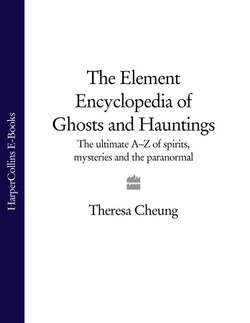Читать книгу The Element Encyclopedia of Ghosts and Hauntings: The Complete A–Z for the Entire Magical World - Theresa Cheung, Theresa Cheung - Страница 171
DIVINATION
ОглавлениеThe art or practice of foretelling the future to discover hidden knowledge, find the lost or identify the guilty by the interpretation of omens or by supernatural powers. All divination is an attempt to communicate with the divine, higher spirit realm or supernatual or to learn the will of the gods. If a distinction is to be made with fortune telling, divination has a formal or ritual or social character, while fortune telling is a more everyday practice for personal purposes. Sceptics often dismiss divination as mere superstition but there is plenty of anecdotal evidence for the efficacy of divination. Others believe that divination is the process by which messages from the unconscious mind are decoded and that these messages have a supernatural source.
Divination is a universal phenomenon that has served a social function in most religions and cultures throughout history as a means of solving problems and resolving conflicts. The responsibility for divination typically falls to a prophet, priest, medicine man, shaman, witch or other person with psychic powers.
In ancient civilizations divination was often a royal or holy function, used for guidance in matters of war or state and to forecast natural disasters. Many courts employed astrologers. In ancient Greece a special caste of priests, called augers, interpreted natural phenomena such as cloud and smoke paterns. The Greeks consulted horoscopes, dreams and oracles for divination purposes, the most famous oracle being the one at Delphi, near Mount Parnasus. In tribal and shamanic cultures divination is a sacred function performed by shamans who go into a trance to consult spirit helpers. In the East divination is more an accepted part of daily life than it is in the West where it has been criticized strongly by the Church and by the scientific community. Despite condemnation, however, divination has not been eradicated in the West and the majority of people remain open minded and curious about the possibility of seeing into the future.
There are hundreds of different types of divination, but they can be classified as belonging to one of two categories: direct communication with gods and spirits through visions, trance, dreams and possession, or the interpretation of natural or artificial signs, lots or omens via a system. The most common example of the latter involves the sorting or casting of bones, stones, beans or other objects, with conclusions drawn from the patterns of their fall. Two well-known divination methods – the I Ching and the Tarot – are of this type. When a card, coin or stick is selected the randomness of the action allows the spirits or gods to affect the outcome and give a message.
Scientific research has shown that it is possible to predict future events, e.g. weather forecasts, but this is not divination. Unlike science, divination assumes the influence of some supernatural force.
Divination methods range from the accepted and well known, such as astrology, palmistry and Tarot, to the forgotten, such as entomancy (divination interpreting the appearance and behaviour of insects), to the bizzarre, such as uromancy – divination by reading the appearance of urine in a pot. Most terms associated with divination end in ‘mancy’, from the Greek manteia (divination), or ‘scopy’ from the Greek skopein (to look into or behold). A diviner is someone who foretells future events based on the practice of divination.
